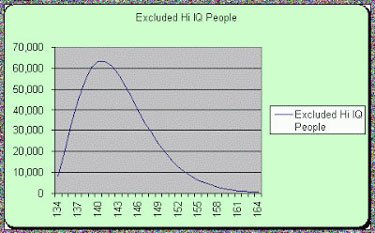Michael Ferguson offers a plausible explanation for the intellectual mediocrity and conformism of our establishment elite: the establishment selects against overly high intelligence (!).
The probability of entering and remaining in an intellectually elite profession such as Physician, Judge, Professor, Scientist, Corporate Executive, etc. increases with IQ to about 133. It then falls about 1/3 by 140. By 150 IQ the probability has fallen by 97%! In other words, a significant percentage of people with IQs over 140 are being systematically and, most likely inappropriately, excluded from the population that addresses the biggest problems of our time or who are responsible for assuring the efficient operation of social, scientific, political and economic institutions. This benefits neither the excluded group nor society in general. For society, it is a horrendous waste of a very valuable resource. For the high IQ person it is a personal tragedy commonly resulting in unrealized social, educational and productive potential. …
Over an extensive range of studies and with remarkable consistency, from Physicians to Professors to CEOs, the mean IQ of intellectually elite professions is about 125 and the standard deviationn is about 6.5. For example, Gibson and Light found that 148 members of the Cambridge University faculty had a mean IQ of 126 with a standard deviation of 6.3. The highest score was 139. J.D. Matarazzo and S.G. Goldstein found that the mean IQ of 80 medical students was 125 with a standard deviation of about 6.7. There was one outlier at 149, but the next highest score was 138. This means that 95% of people in intellectually elite professions have IQs between 112 and 138 99.98% have IQs between 99 and 151.
By dividing the distribution function of the elite professions’ IQ by that of the general population, we can calculate the relative probability that a person of any given IQ will enter and remain in an intellectually elite profession. We find that the probability increases to about 133 and then begins to fall. By 140 it has fallen by about 1/3 and by 150 it has fallen by about 97%. In other words, for some reason, the 140s are really tough on one’s prospects for joining an intellectually elite profession. It seems that people with IQs over 140 are being systematically, and likely inappropriately, excluded. With the conservative assumption that, absent the exclusionary processes, IQs above 133 neither help nor hinder the achievement of elite profession membership, the excluded population is distributed as shown above. If we assume that the positive correlation seen below 133 IQ continues above 133, the excluded population would be larger and the exclusion more complete.
This is a theory which explains so very much.
Hat tip to Vanderleun.







SDD
“absent the exclusionary processes, IQs above 133 neither help nor hinder the achievement of elite profession membership”
That’s simply not true. I can only speak about the business community, but if success in business is, as the author suggests, measured by whether or not you become a CEO, then super high intelligence actually IS a hindrance.
A CEO’s success is driven much more by his ability to effectively direct those that work for him in the organization than it is by his brilliant thinking (The Steve Jobs story is an outlier). That has little to do with IQ, and, in fact, in my experience, others in the organization often resent working for those who are smarter than they. Super-smart CEOs are made less effective by this factor.
If your skill set and your desires revolve around conceiving and articulating brilliant ideas, you are much better off someplace in the organization OTHER than the CEO’s office. We are all paying a steep price because a young Senator from Illinois didn’t come to that understanding ten years ago.
Marc
I’m gonna have to object that people hate working for individuals smarter than they. How about Bezos story.
https://plus.google.com/110981030061712822816/posts/AaygmbzVeRq
and some other account I can’t find.
Maybe there’s a limit to how much smarter you can be than them. But I believe you could be. I think the 30 point scale is more about closer relations than and leadership has a wider reach.
Please Leave a Comment!